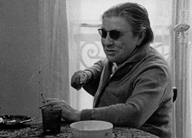Number Zero
Numéro Zéro FRANCE / 1971 / French / B&W / 35mm / 110 min
FRANCE / 1971 / French / B&W / 35mm / 110 min
Director: Jean Eustache
Photography: Philippe Théaudière
Sound: Jean-Pierre Ruh
Appearances: Odette Robert, Jean Eustache
Source: Capricci Films
21, Bd Victor Hugo, Nantes 44200 FRANCE
 Jean Eustache
Jean EustacheBorn in 1938 in Pessac, France. Moved to Paris in 1958 and made the acquaintance of Cahiers du cinéma critics. Directed Santa Claus Has Blue Eyes (1966), which was strongly influenced by the Nouvelle Vague. Before shooting the features The Mother and the Whore (1973) and My Little Lovers (1974), directed documentary films including La Rosière de Pessac (I) (1968), Le Cochon (co-directed with Jean-Michel Barjol, 1970) and Number Zero, which consists mainly of an interview with his grandmother. This film has only been released in the shorter version. In 1977, directed Une sale histoire, an experimental film with two versions (fiction/non-fiction) of the same story of a voyeur. After completing several shorter films including the documentary La Rosière de Pessac (II) (1979), he shot himself in 1981. |
Number Zero, short story of a first time
Jean Eustache organized one or two private screenings of Number Zero, but the film was never released. “I censored the audience instead of censoring the film.” But some years later he had to turn the original two-hour film into an hour-long montage for a television series on grandmothers. These “fragments,” as Eustache called them, were named Odette Robert after his own grandmother.
The plan to locate and distribute Number Zero came later. The occasion was the “Sheherazade” program I was preparing for the 2002 International Documentary Festival/Marseille on the mythological and imaginative power of documentary film.
And then the search begins. As always is the case with Eustache, a call is made to his son Boris. He has a work print, but doesn’t know what happened to the negative. A call is placed to the INA, but they don’t have it either. Eric Leroy from the Archive du Film traces the negative through 1985, when it left the Eclair laboratory.
Another phone call is placed to the INA. I insist. They have a duplicate of a version that is longer than Odette Robert, but the running time doesn’t seem to correspond with Number Zero. “I’d like to view the film.” An appointment is made.
Boris Eustache and I go to the INA, where we find only the image of a duplicate. We restart our search. Some weeks pass. Boris brings the audio from the work print to FEMIS. We match it up with the image: they fit perfectly. This is the complete Number Zero. Nothing is lacking, not even the silent opening shot by Adolfo Arietta.
July 2002. The first public screening of Number Zero takes place in Marseille. Juror Pedro Costa takes care of the technical adjustments. He proposes that the Cinemateca Portuguesa should handle the blowup to 35mm. Some weeks pass. Discussions take place with Roger Diamantis about a theatrical release at the Saint-André-des-Arts. The date is fixed finally for January 22, 2003.
It isn’t my role to justify this release. I would simply like to say that Number Zero is a great work—which was amply proved by the audience at Marseille, including diligent enthusiast Jia Zhangke; that we have yet to come to grips with the significance of Eustache in French cinema; that his documentaries must be given the same place as his fiction films; that once we regain a balanced perception of his work, we can break with the many received ideas about Eustache, including the post-Nouvelle Vague, the modern, Parisian, etc. And that teaching a cinema that is more ample and more immemorial continues to be important.
—Thierry Lounas
• Special Invitation Films | DV2 | Sound of Brasil | Number Zero | <In Memory of Maeda Katsuhiro> Polluted Japan, Free Kwangju | Magino Village—A Tale |
